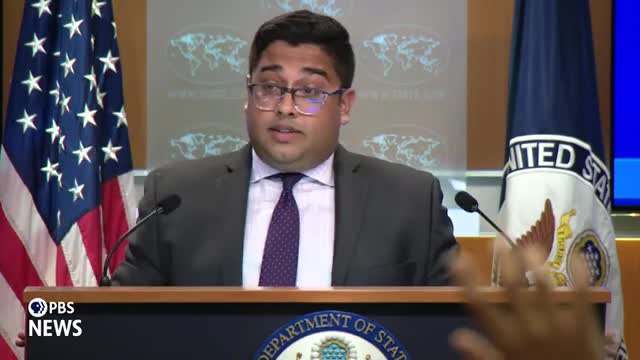US State Department faces backlash over Taliban support

This article was created by AI summarizing key points discussed. AI makes mistakes, so for full details and context, please refer to the video of the full meeting. Please report any errors so we can fix them. Report an error »

In a recent government meeting, discussions centered on the U.S. stance regarding Pakistan and Afghanistan, particularly in light of ongoing human rights concerns and the situation surrounding the Taliban. A Pakistani parliament member highlighted perceived U.S. interference in Pakistan's elections, referencing a bipartisan House resolution that favored the legitimacy of those elections. However, U.S. officials refrained from commenting on pending congressional legislation, emphasizing the separation of powers within the U.S. government.
The meeting also addressed the detention of former Pakistani Prime Minister Imran Khan, with the United Nations labeling it as illegal. U.S. representatives reiterated their commitment to urging the Pakistani government to uphold human rights, including freedom of expression and peaceful assembly.
Concerns were raised about the Taliban's treatment of women and girls, particularly in the context of the ongoing Doha conference. U.S. officials confirmed their participation in discussions aimed at addressing human rights issues, stressing that the Afghan economy cannot thrive while half the population is denied their rights. They noted that the Taliban's policies are significantly harming Afghanistan's economic potential.
Despite the Taliban's claims of support from various countries for lifting restrictions on banking, U.S. representatives clarified that private banks remain hesitant to engage due to the Taliban's human rights record. They emphasized that while there are no formal restrictions on economic avenues, the reputational risks associated with the Taliban's governance continue to deter investment.
The meeting concluded with a commitment to further investigate the status of a Swiss fund established to support the Afghan people, reflecting ongoing international efforts to address the humanitarian crisis in Afghanistan.
The meeting also addressed the detention of former Pakistani Prime Minister Imran Khan, with the United Nations labeling it as illegal. U.S. representatives reiterated their commitment to urging the Pakistani government to uphold human rights, including freedom of expression and peaceful assembly.
Concerns were raised about the Taliban's treatment of women and girls, particularly in the context of the ongoing Doha conference. U.S. officials confirmed their participation in discussions aimed at addressing human rights issues, stressing that the Afghan economy cannot thrive while half the population is denied their rights. They noted that the Taliban's policies are significantly harming Afghanistan's economic potential.
Despite the Taliban's claims of support from various countries for lifting restrictions on banking, U.S. representatives clarified that private banks remain hesitant to engage due to the Taliban's human rights record. They emphasized that while there are no formal restrictions on economic avenues, the reputational risks associated with the Taliban's governance continue to deter investment.
The meeting concluded with a commitment to further investigate the status of a Swiss fund established to support the Afghan people, reflecting ongoing international efforts to address the humanitarian crisis in Afghanistan.
View full meeting
This article is based on a recent meeting—watch the full video and explore the complete transcript for deeper insights into the discussion.
View full meeting